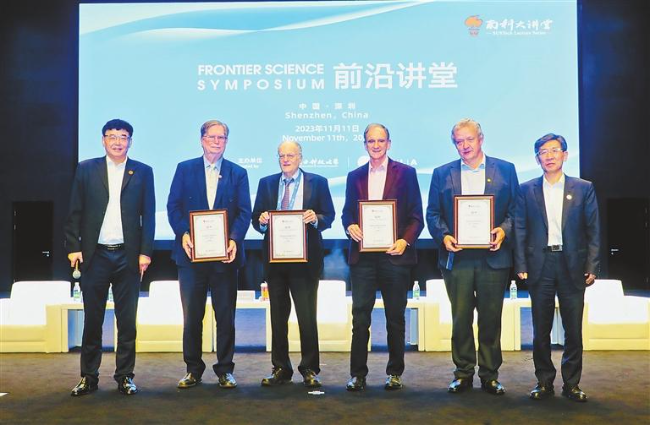Top scientists share insights on future of science at symposium
2023-11-15

Xue Qikun (R), president of the Southern University of Science and Technology (SUSTech), presents certificates from SUSTech to George Smoot (2nd L), Nobel laureate in physics (2006), Thomas Sargent (3rd L), Nobel laureate in economics (2011), Martin Hellman (3rd R), Turing Award winner (2015), and Yurii Nesterov (2nd R), WLA Prize laureate in computer science or mathematics (2023), Saturday. Courtesy of SUSTech
FOUR distinguished scientists, including two Nobel laureates, delved into the forefront of scientific exploration and shared insights into the future of science at the SUSTech Lecture Series — Frontier Science Symposium on Saturday.
The symposium, a collaborative effort between the Southern University of Science and Technology (SUSTech) and the World Laureates Association (WLA), captivated over 600 attendees, including teachers, students, and local residents eager to grasp the latest developments in the scientific realm.
The speakers included George Smoot, Nobel laureate in physics (2006), Thomas Sargent, Nobel laureate in economics (2011), Martin Hellman, Turing Award winner (2015), and Yurii Nesterov, WLA Prize laureate in computer science or mathematics (2023).
During discussions on the topic “Today and Future Cosmology,” Smoot introduced cosmological concepts such as dark matter, dark energy, the Big Bang, cosmic microwave background radiation, and the accelerating expansion of the universe. He explained the evolution of the universe through observations of early galaxies through the James Webb Space Telescope.
Sargent gave a talk on “Promises and Limits of Machine Learning.” He described current machine learning challenges and solutions, and outlined how structural economy statisticians can infer patterns from incomplete observations of the prices and quantities of goods.
For the topic “The Promise and Threat of Technology,” Hellman expressed concerns about the impact of technologies such as artificial intelligence and nuclear weapons on humanity’s future.
Hellman advocated for respect for the spirit of science in personal and international relations. He also emphasized the crucial role of ethical considerations in guiding scientists to ensure technology is wielded for the greater good, safeguarding the survival of mankind in this rapidly advancing technological age.
Nesterov’s presentation on “Optimization Challenges of Big Data” highlighted the evolving requirements of the current big data framework for optimization programs. Using concrete examples, he demonstrated how big data can effectively address large-scale computing problems by analyzing social data through expansive internet networks.
In his opening speech, Xue Qikun, president of SUSTech, underscored the university’s commitment to exposing students to cutting-edge scientific knowledge and fostering innovation. He expressed SUSTech’s dedication to collaborative efforts with top scientists, aiming to propel the field of science forward for the betterment of humanity. (Shenzhen Daily)
